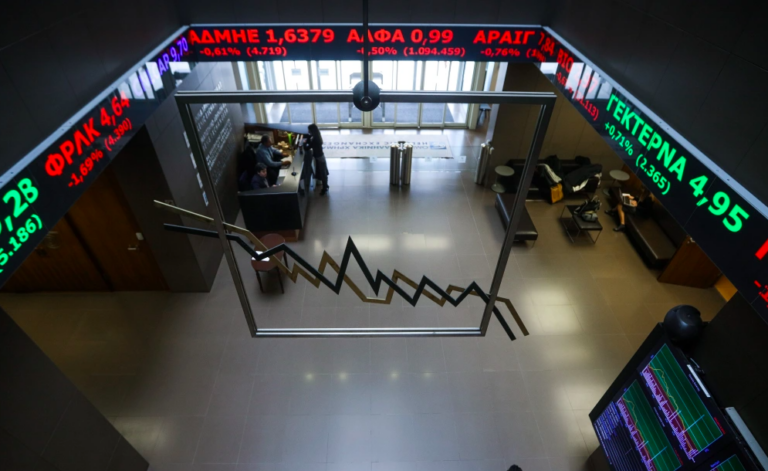The Greek stock market experienced a new downturn following a similar movement at the end of the previous week. The initial rise to around 1,440 points was followed by a shift in investor sentiment, with Athens failing to align with the positive mood of European markets. However, the losses did not cause concern as the support level at 1,430 points remained intact.
Specifically, on Tuesday’s session (August 27), the General Index fell by 5.22 points or -0.36%, closing at 1,432.46 points, near the day’s low of 1,432.31 points. The day’s high was recorded at 1,447.64 points. Market sentiment was marked by nervousness and selective trading, erasing initial gains. The General Index maintains a distance from the support level of 1,400 points and the moving average (MA) of 1,386 points, a limit breached earlier this August.
The volatile environment is also reflected in the fact that the General Index moved within a broader price range than seen in recent days. Fluctuations on the board were mild, as few high-cap stocks recorded significant changes. Turnover remained low, significantly below 100 million euros.
Domestic Market Outlook
The Athens Stock Exchange continues to be “trapped” in the 1,425-1,440 point range in the latter half of August. This stability follows the intense fluctuations observed at the beginning of the month due to the global sell-off on “Black Monday” (August 5), when the General Index plunged to 1,340 points.
The recovery was swift but not complete, with the July level of 1,470 points currently appearing difficult to reach. The next resistance level is at 1,460 points, and the corresponding support is at 1,420 points. Investors are looking for increased activity with turnover exceeding 100 million euros, ahead of a September filled with developments.
Eyes are mainly on external factors, with traders focusing on U.S. inflation data and Nvidia’s results. Additionally, developments regarding geopolitical tensions in the Middle East are closely monitored. Analysts suggest that the most likely scenario is consolidation around current levels as investors wait for upcoming results.
Cenergy Holdings will announce its Q2 and H1 financial results immediately after today’s market session, with analysts expecting a strong boost in operational profitability. At the same time, EYAΘ has declared a dividend of €0.0276 per share (net amount €0.02622).
Tomorrow is crucial for Motor Oil as it announces its half-year results, with the market anticipating a significant increase in profitability. On Thursday (August 29), HELLENiQ ENERGY, another refinery, will announce its financial performance, along with Austriacard Holdings. Among other things, investors will focus on the impacts of the recent “windfall tax” on refineries.
In the results calendar, next week Sarantis (September 2), OPAP, Trade Estates (both September 3), and Quest Group (September 4) will report. On Wednesday (August 28), GEK TERNA will trade ex-dividend of €0.25 per share, with payment starting on September 3. On Thursday (August 29), Real Consulting will distribute a dividend of €0.04 per share, with payment starting on September 5.
It is also worth noting that on Friday (August 30), MSCI index adjustments will take place, with Motor Oil being removed from the MSCI Standard Greece Index and added to the Small Cap Index. The main Greek stock index in MSCI now includes nine titles: National Bank, Eurobank, Piraeus, Alpha Bank, PPC, OTE, OPAP, Metlen, and Jumbo. These changes will be effective from Monday, September 2.
Regarding FTSE Russell index revisions, Cenergy was upgraded to the FTSE Emerging Europe Large Cap Index from Mid Cap. Conversely, Viohalco was downgraded from Large Cap to FTSE Emerging Mid Cap Index. Intralot was newly added to the Mid Cap index, while Interlife was added to Micro Cap for the first time. Austriacard, ABAΞ, Dimand, Elastron, Lavipharm, Premia, and Plastika Thrakis were removed from the index. These changes will take effect after the close of trading on September 20.
Wall Street Corrects After Record – European Markets Gain
Monday’s session on Wall Street saw a new record for the Dow Jones. Unlike the S&P 500 and Nasdaq, the industrial index remained in an upward trajectory, closing at 41,240 points for the first time ever. Today, the Dow Jones is correcting from its historic high, with controlled pressures. The Fed’s rate cut signal is losing momentum, with traders focusing more on listed companies’ results.
In contrast, European stocks recorded positive signs, although the contraction of the German GDP acted as a “brake” on further gains. Trading activity increased as the London Stock Exchange resumed operations after yesterday’s national bank holiday. The geopolitical crisis in the Middle East remains prominent, affecting oil prices, which have risen sharply recently.
Asian markets closed today without significant tension. Chinese indices faced stronger pressures, while the Japanese Nikkei and Hong Kong’s Hang Seng moved into positive territory. The market mood was impacted by Canada’s decision to impose additional tariffs on electric vehicle imports, as well as steel and aluminum from China.
Ask me anything
Explore related questions





